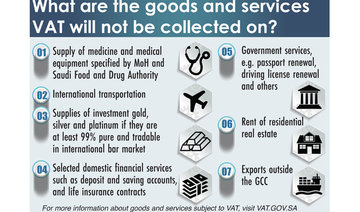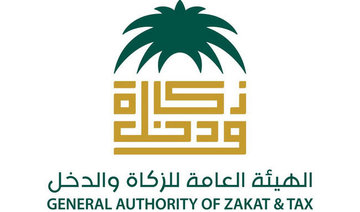JEDDAH: The introduction of value-added tax (VAT) next year will directly impact the prices of commodities and services, analysts said.
“The price increase will reduce the demand for goods, and this will have a negative effect on companies, most of which will likely take several measures to keep their business,” Khalid Al-Zaidi, a financial analyst, told Arab News.
He hoped the price rise would not affect the quality of goods and services. “If it happened, it is a negative indication. However, the price hike will push consumers to find ways to save money,” he said. Businesses must register for VAT by the deadline of Dec. 20, and the official introduction starts on Jan 1.
Al-Zaidi also said there would be a sharp drop in demand for luxury goods and accessories.
He anticipated that companies will be keen to improve their services at competitive prices, especially with the opening of international markets through e-commerce. He stressed that the best service-providers with the lowest costs will succeed in the market, while other businesses will fail.
Al-Zaidi, who is also the director of the Jeddah-based Al-Zaidi Financial Education Center, said that it is possible that the government will impose additional taxes on other products or increase VAT from 5 percent.
“If the results are found to be supportive to the country’s economy and helps citizens to rationalize their consumption habits, additional taxes will be implemented,” he said.
On the up side, Al-Zaidi said that once VAT is imposed on petroleum products, the country will be able to cut domestic consumption of oil products.
“This will help Saudi Arabia increase the quantity of its oil reserves and enable it to increase its export of oil to the international market,” he said.
He added that this could support its global position as an important player in the oil market. “It will also strengthen its oil pricing policy inside OPEC (the Organization of the Petroleum Exporting Countries),” he said.
Al-Zaidi anticipated that small and medium-sized companies will find it difficult to adapt to VAT, making it difficult to significantly reduce their expenses to survive.
As for imposing VAT on private education, Al-Zaidi said that investors in this sector would reduce fees to retain their market share. “Otherwise, their investment would be severely affected,” he said.
Khaldoun Khan, the owner of Al-Corniche International School and Al-Faisal International School, told Arab News that students’ guardians would be affected by the decision, and he would not increase registration fees. He said that his schools would lose some students. “Students have started to join state schools due to the decision,” he said.
Khan said that he would have another look at the profits and consider providing students with attractive offers to keep his business alive. “Unless the government reviews the decision, many school owners will choose to close their schools,” he said.
The General Authority of Zakat and Tax (GAZT) has urged businesses with annual revenues of more than SR1 million ($266,640) to expedite their VAT registration process and ensure their readiness for its implementation.
More than 60,000 businesses have registered for VAT since registration started on Aug. 28, 2017.
Businesses that fail to register in time will face fines of up to SR10,000 and the suspension of several critical government services, including issuing work permits, changing business activity, issuing visas, transferring workers’ sponsorship and other services provided by the Ministry of Commerce and Industry, the Ministry of Labor and Social Development, the Ministry of Municipal and Rural Affairs, Saudi Customs and the Saudi Arabian Monetary Agency.
The GAZT confirmed that VAT will be implemented on Jan. 1 next year, and that all eligible businesses must be ready and aware of its laws, regulations and requirements — available on the VAT website vat.gov.sa.
The GAZT first imposed a selective tax on energy drinks, cigarettes and soda drinks. It also increased the visit visa fee, exit re-entry fee and dependent fee for expatriates.
Saudi VAT impact: Price hike ‘will push consumers to find ways to save money’
Saudi VAT impact: Price hike ‘will push consumers to find ways to save money’

Saudi Arabia welcomes India-Pakistan ceasefire, urges dialogue

- Kingdom commends both parties for prudence, self-restraint amid heightened tensions
RIYADH: The Saudi Ministry of Foreign Affairs on Saturday welcomed the US-mediated ceasefire agreement between Pakistan and India, expressing hope that the development will pave the way for restoring security and stability in the region.
In an official statement carried by the Saudi Press Agency, the Kingdom commended both parties for their prudence and self-restraint amid heightened tensions, and reiterated its support for resolving disputes through dialogue and peaceful means.
Saudi Arabia emphasized the importance of adhering to the principles of good neighborliness in a manner that promotes peace and prosperity for both countries and their peoples.
The ceasefire announcement came on Saturday after both Islamabad and New Delhi confirmed the agreement following a period of escalated hostilities.
The de-escalation followed US-mediated talks late on Friday night, with President Donald Trump stating that Washington had played a key role in brokering the understanding between the nuclear-armed neighbors.
Saudi FM receives his Iranian counterpart in Jeddah

- Araqchi traveled to Jeddah to meet with senior Saudi officials
- The visit comes ahead of possible indirect US-Iran talks in Oman on Sunday
RIYADH: Saudi Foreign Minister Prince Faisal bin Farhan on Saturday received his Iranian counterpart Abbas Araghchi in Jeddah, Al Arabiya News Channel reported.
Araghchi traveled to Jeddah to meet with senior Saudi officials and discuss bilateral issues and regional and international developments.
He is expected to later travel to Qatar to participate in the Iran-Arab World Dialogue summit in Doha, an Iranian ministry spokesperson said on Friday.
The visit also comes ahead of scheduled indirect US-Iran talks in Oman on Sunday and an expected trip to the region by US President Donald Trump.
Little Explorer event in Jeddah connects young minds with archeology, heritage

- Initiative offered interactive, engaging educational experience
Jeddah: The Little Explorer event, which was organized by the Heritage Commission in Jeddah and ran from May 6-10, offered an interactive and engaging educational experience for children.
The event aimed to raise awareness about the importance of archeological excavation and strengthen the connection between younger generations and the Kingdom’s cultural heritage, the Saudi Press Agency reported.
Blending entertainment with education, the event sought to foster a generation that values antiquities and their role in strengthening national identity.
Held in Bab Jadeed, the event was part of the commission’s efforts to engage young people in heritage preservation through educational and hands-on activities, which introduced archeological principles and promoted the protection of historic sites.
The event featured five main pavilions, each designed as an educational and interactive station, according to the SPA.
The Little Explorer’s Tale took place in an interactive cinema screening an educational animation that simulated an exploratory journey to the Al-Faw archeological site, offering an engaging introduction to cultural heritage.
Children at the Explorer’s Academy viewed authentic artifacts from various civilizations and learned about excavation tools and archeological processes.
The Excavation Simulation offered a hands-on experience, allowing participants to search for artifacts using real tools in a realistic sand-filled setting.
The Archeological Workshop provided a space for creative drawing with children learning about historic monuments with the help of iPads.
The Play and Learn area combined recreational games with archeological themes, making heritage exploration both fun and educational for children.
Olympiad delegates explore Saudi heritage, hospitality

Dhahran: International delegations taking part in the Asian Physics Olympiad, hosted by Saudi Arabia in Dhahran from May 4 to 12, enjoyed a dynamic schedule of scientific competitions, cultural activities, educational events and entertainment.
The enriching experience brought together 240 students from 30 countries and 110 international physics specialists, the Saudi Press Agency reported.
Beyond the competitions, the program included educational and cultural visits highlighting Saudi Arabia’s rich heritage and scientific progress, while promoting global youth engagement and cultural exchange.
Wearing traditional Saudi attire as a sign of respect, participants experienced the Kingdom’s hospitality, sampled Saudi cuisine and took part in interactive events that fostered cultural connection.
This year’s Olympiad holds special significance as it marks the 25th anniversary of the competition. For more than two decades, it has united talented youth from across the globe, encouraging scientific excellence and cross-cultural understanding.
The final results — organized by the Ministry of Education, the King Abdulaziz and His Companions Foundation for Giftedness and Creativity, and King Fahd University of Petroleum and Minerals — will be announced during the closing ceremony on May 11 at King Fahd University in Dhahran.
Kingdom arrests 15,928 illegals in one week

RIYADH: Saudi authorities arrested 15,928 people in one week for breaching residency, work and border security regulations, the Saudi Press Agency reported on Saturday.
A total of 10,179 people were arrested for violations of residency laws, while 3,912 were held over illegal border crossing attempts, and a further 1,837 for labor-related issues.
The report showed that among the 1,248 people arrested for trying to enter the Kingdom illegally, 63 percent were Ethiopian, 35 percent Yemeni, and 2 percent were of other nationalities.
A further 45 people were caught trying to cross into neighboring countries, and 26 were held for involvement in transporting and harboring violators, the SPA reported.
The Ministry of Interior said that anyone found to be facilitating illegal entry to the Kingdom, including providing transportation and shelter, could face imprisonment for a maximum of 15 years, a fine of up to SR1 million ($260,000), as well as confiscation of vehicles and property.
Suspected violations can be reported on the toll-free number 911 in the Makkah and Riyadh regions, and 999 or 996 in other regions of the Kingdom.




















